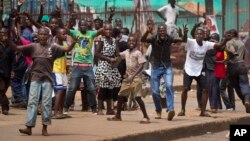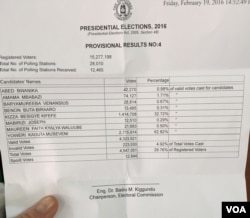Tensions escalated in Uganda on Friday outside the headquarters of the Forum for Democratic Change - the political party of opposition candidate Kizza Besigye - following his third arrest this week. Protesters threw stones and blocked roads in the capital, Kampala, and police fired teargas to bring the situation under control. Meanwhile, partial election results show Besigye trailing President Yoweri Museveni.
The altercation started after Besigye called a press conference Friday afternoon. Police surrounded the building and fired teargas into the FDC compound. Soon after, they arrested Besigye and several top-level FDC members. Besigye's wife has tweeted he was taken to Nagalama police station outside the city.
This led FDC supporters to throw stones at police and set up barricades near the FDC headquarters, Kiseka Market, Katwe and Bwaise. Much of the unrest was put down quickly by police using teargas.
Residents also report hearing gunfire, although there's been no confirmation of whether these were rubber bullets or live ammunition. The Ugandan Red Cross says that four injured persons were taken to Mulago hospital, although none had bullet wounds.
Police have now deployed heavily throughout Kampala. Police spokesperson Fred Enanga put out a statement saying they had received intelligence that students were planning a riot and that heavy deployment of military police was a preventative measure.
The U.S. Embassy has warned Americans in Kampala to stay off the streets.
Meanwhile in Kololo, police surrounded the residence of another presidential candidate, Amama Mbabazi. He was later escorted off the premises by a police officer, although it was not clear if this was an arrest. Earlier, Mbabazi released a statement saying police were arresting people outside his residence, and posted video of officers patrolling the streets.
Fraud allegations
Tensions have been high in Uganda since Thursday, when many polling stations did not receive voting materials until late in the day. This led to confrontations between voters and the police – which included multiple rounds of teargas.
Although polling stations opened again in some areas Friday, many feel the delays were part an effort by the Ugandan Electoral Commission to rig the election -- an allegation denied by the commission.
Besigye was initially arrested at a rally on Monday and again on Thursday night, when he arrived at a house in the suburb of Nuguru and accused those inside of stuffing ballot boxes. He said he and his supporters had "corroborated information" the house they visited was being used as the hub for rigging the election.
Police insisted that the house was a security facility and that Besigye was arrested for trespassing.
Besigye, who is Museveni's toughest competition, alleges that the election in general was subject to vote rigging, rendering it "unfree and unfair".
Besigye accused Museveni and the ruling NRM party of using poll-rigging and intimidation of voters to secure victory in the 2006 and 2011 elections.
Museveni leads provisional results
Provisional results released by Uganda's electoral commission Friday show President Museveni leading with about 62 percent of the vote, followed by Besigye with 32 percent. Mbabazi trailed in third place, with less than 2 percent.
The tally includes results from just under half of the 28,000 polling stations nationwide.
But 36 polling stations in the capital, Kampala, and Wakiso district, where support for the opposition is strong, were continuing to vote Friday to make up for Thursday's delays.
Social media blackout
U.S. State Department spokesman John Kirby spoke out against Besigye's arrest Thursday, and said the United States is also concerned about the delays in voting and an apparent block on social media sites such as Twitter, Facebook and Instagram that started Thursday morning.
The U.N. envoy in charge of human rights issues in Uganda, Uchenna Emelonye, said the delays and the social media block had a human rights implication that had been raised with national authorities.
The head of the Uganda's Communications Commission said the social media sites were blocked for security reasons.
VOA reporter James Butty contributed to this report.






